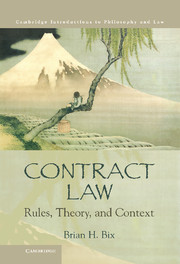Book contents
- Frontmatter
- Contents
- Preface
- 1 Philosophical Problems of Contract Law
- 2 History and Sources
- 3 Formation
- 4 Interpretation
- 5 Performance
- 6 Enforcement and Remedies
- 7 Special Categories of Contract Law
- 8 Modern Contract Law Practices
- 9 How Many Contract Laws?
- Bibliography
- Table of Cases
- Statutes and Restatements
- Index
- References
5 - Performance
Published online by Cambridge University Press: 05 November 2012
- Frontmatter
- Contents
- Preface
- 1 Philosophical Problems of Contract Law
- 2 History and Sources
- 3 Formation
- 4 Interpretation
- 5 Performance
- 6 Enforcement and Remedies
- 7 Special Categories of Contract Law
- 8 Modern Contract Law Practices
- 9 How Many Contract Laws?
- Bibliography
- Table of Cases
- Statutes and Restatements
- Index
- References
Summary
Much of the work of contract lawyers consists in advising clients on how to respond to developments after an agreement has been signed: in particular, whether a certain outside event, defective performance, failure of performance, or threat not to perform would justify nonperformance, or different performance, on behalf of one's client. The present chapter looks at the various and interrelated questions that arise in the performance of an agreement.
CONDITIONS
On-Off Switches
A condition is an on-off switch. It is either an event that creates an obligation to perform under the contract where one had not been before or an event that removes or modifies an obligation to perform that had previously been in effect. The Restatement offers the following, somewhat awkward, definition: “A condition is an event, not certain to occur, which must occur, unless its non-occurrence is excused, before performance under a contract becomes due.” As is discussed here, it is important to distinguish conditions from promises (although on rare occasion a provision can be both a condition and a promise).
- Type
- Chapter
- Information
- Contract LawRules, Theory, and Context, pp. 71 - 86Publisher: Cambridge University PressPrint publication year: 2012



